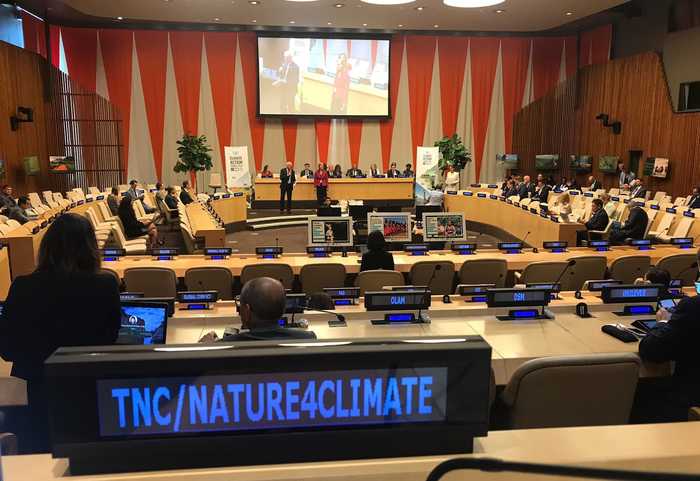
Secretary-General António Guterres noted this week, “that we fool ourselves if we think we can fool nature and that nature was a critical part of the climate solution. This was echoed by Inger Andersen from UNEP saying that ‘in order to arrest this emergency, and as we decarbonize our economies, we must bring one of our most powerful allies into the fight now – nature.’ Here are N4C’s top ten takeaways:
Read more
Related articles for further reading
Wednesday 25th September
With the Earth’s oceans and frozen regions changing alarmingly quickly altering the planet’s seas and cryosphere and the largest collection of global climate strikes ever, this week’s UN Climate Action Summit and Climate Week provided compelling reasons for an urgent and renewed call to action around climate change.
Secretary-General António Guterres noted this week, “that we fool ourselves if we think we can fool nature and that nature was a critical part of the climate solution. This was echoed by Inger Andersen from UNEP saying that ‘in order to arrest this emergency, and as we decarbonize our economies, we must bring one of our most powerful allies into the fight now – nature.’
Here are N4C’s top ten takeaways:
- Corporates are setting new targets around nature-based solutions as a solution to climate change. The World Business Council for Sustainable Development (WBCSD) and Emmanuel Faber (CEO of Danone) announced a new coalition of 19 global companies focused on agriculture and committed to biodiversity. One Planet Business for Biodiversity is ‘determined to drive transformational systemic change.’ In a separate event to announce a new partnership with WCS, CEO Sunny Vergehese from Olam said: “It is absolutely essential for us to reimagine the global food and agriculture system.”
- Countries are waking up to nature’s potential – The Climate Action Summit introduced a nature-based solutions ‘manifesto’, aiming to garner political momentum, financing, and integration of nature in planning and decision making for sustainable development. Numbers steadily rose this week.
- China is emerging as a champion for nature –China has emerged as a champion for nature-based solutions to climate change. As co-lead of the Climate Action Summit’s nature-based solutions action area, China is calling for a systematic understanding of the relationship between human beings and nature. It is urging incorporating nature-based solutions in the post-2020 global biodiversity framework and giving consideration to the potential of natural systems to facilitate mitigation and adaptation.
- Innovation is happening – More than a third of the events of Climate Week focused on nature-based solutions. Twenty-two communities were honored for local, innovative, nature-based climate solutions this week at the Equator Award These are indicative of the kind of local, often indigenously led, community-based initiatives taking place to address land degradation and livelihood opportunities.
- The Youth are taking a lead — Last Friday, millions of young people took to the streets in a global climate strike to demand more climate action, a message that Swedish climate activist Greta Thunberg delivered directly to world leaders at the UN Climate Summit. Support for nature emerged as one of the movement’s key themes this week. Greta released a video on nature-based solutions last week and a new movement, Youth4Nature, has been on the ground in New York showcasing youth-led nature-based initiatives for climate solutions around the world.
- Money moves We saw the launch of the Net-Zero Asset Owner Alliance. Its members, responsible for directing more than US$ 2.4 trillion in investments, committed to carbon-neutral investment portfolios by 2050. The World Bank and Germany announced the launch of PROGREEN, a new global partnership to boost efforts to stop deforestation. Germany is contributing 200 million Euros to kickstart the program. The Bill and Melinda Gates Foundation and the World Bank announced, along with several governments, financial commitments of $790 million and assistance to enhance resilience of more than 300 million small-scale food producers in the face of mounting climate impacts. Through the Central African Forest Initiative (CAFI), Norway will pay $150 million to Gabon to reduce greenhouse gas emissions and battle deforestation. This makes Gabon the first African country to be paid to preserve its rainforest with international funds.
- Ocean as a climate solution This week’s IPCC’s Special Report on the Ocean and Cryosphere made clear the need to revolutionize and scale up our current approaches to ocean and cryosphere protection and sustainable management. While the IPCC report and science tell us that we are at risk the High-Level Panel for a Sustainable Ocean Economy revealed how four ocean-based strategies, if undertaken by the world’s countries, can give us 21% of the greenhouse gas reductions needed to meet the 2015 Paris agreement and keep global temperatures below 1.5 degrees Celsius. The report lays out in detail opportunities to enhance ocean-based renewable energy activities and reduce emissions from ocean transport and fisheries.
- We know the scientific limits There is no way we can limit warming to 1.5°C (or 2°C for that matter) without natural climate solutions. Emission reductions alone – while critically important – will not achieve the goals of the Paris Agreement. It is not “either, or.” It is “both, and.” Increasing ambition means committing both to an energy transition and greater investment in NBS.
- Nature across all biomes is an essential tool for addressing the threats to climate, biodiversity and sustainable development in the coming decade. The reality of this is sinking in and the politics are shifting to launch a decade of restoration, regeneration and funding in 2020.
- Political will is needed now that awareness has been raised. NBS do not come at the cost of other development priorities. They can be rolled out in ways that combat land degradation, put healthy and nutritious food on peoples’ tables, deliver economic benefits, create jobs in rural communities and build resilience to climate change, all at the same time.